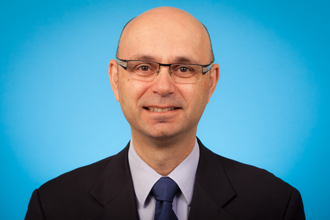Rates of head collision events at women’s and men’s World Cups similar but women received more medical assessments: study

By Jennifer Stranges

Dr. Michael Cusimano
Female and male soccer players had similar rates of head collision events during elite tournaments such as the World Cup but half of the female players involved received medical assessments, compared with only one third of the impacted male players, according to research led by St. Michael’s Hospital of Unity Health Toronto.
The study, publishing in JAMA on Jan. 21, 2020, did not find significant differences in the numbers of female players removed from play compared with male players. The median time that play was stopped for a medical assessment in women’s tournaments was 70 seconds compared to about 50 seconds in men’s matches. Researchers pointed out a minimum 10 minutes is required to perform a concussion assessment.
“There is international consensus that athletes who sustain a potentially concussive head collision should be given a proper medical assessment and be removed from play until a qualified professional can determine that it is safe for them to return to play,” said Dr. Michael Cusimano, lead researcher and a neurosurgeon at St. Michael’s Hospital.
“It is clear that this is not happening in elite women’s or men’s play at this time.”
Researchers reviewed 52 matches of the 2019 FIFA Women’s World Cup and monitored for the frequency and medical assessment of head collision events, time stopped for assessment, and visible concussion signs. The data was compared against the 2014 and 2018 FIFA Men’s World Cup and the 2016 UEFA Euro Cup. In the matches reviewed, 84 per cent of female athletes and 88 per cent of male athletes showed two or more visible signs of concussion after a head collision event, including clutching of the head or disequilibrium.
Dr. Cusimano, who is also a scientist at the Li Ka Shing Knowledge Institute of St. Michael’s, said the popularity of soccer internationally, as well as the frequency of concussions in the sport, creates an urgency to address this issue. He suggested increasing the role of video assistant referees, employing independent medical assessors, or allowing temporary player substitutions to provide sufficient time for medical assessments.
“Hundreds of millions of people play soccer – it is the world’s largest and fastest growing sport. Tournaments like the FIFA World Cup attract millions of viewers, and the examples set by elite athletes and officials affect how players and officials globally, at any level, deal with concussions.”
About St. Michael’s Hospital
St. Michael’s Hospital provides compassionate care to all who enter its doors. The hospital also provides outstanding medical education to future health care professionals in more than 27 academic disciplines. Critical care and trauma, heart disease, neurosurgery, diabetes, cancer care, care of the homeless and global health are among the Hospital’s recognized areas of expertise. Through the Keenan Research Centre and the Li Ka Shing International Healthcare Education Centre, which make up the Li Ka Shing Knowledge Institute, research and education at St. Michael’s Hospital are recognized and make an impact around the world. Founded in 1892, the hospital is fully affiliated with the University of Toronto.
About Unity Health Toronto
Unity Health Toronto, comprised of Providence Healthcare, St. Joseph’s Health Centre and St. Michael’s Hospital, works to advance the health of everyone in our urban communities and beyond. Our health network serves patients, residents and clients across the full spectrum of care, spanning primary care, secondary community care, tertiary and quaternary care services to post-acute through rehabilitation, palliative care and long-term care, while investing in world-class research and education. For more information, visit www.unityhealth.to.
